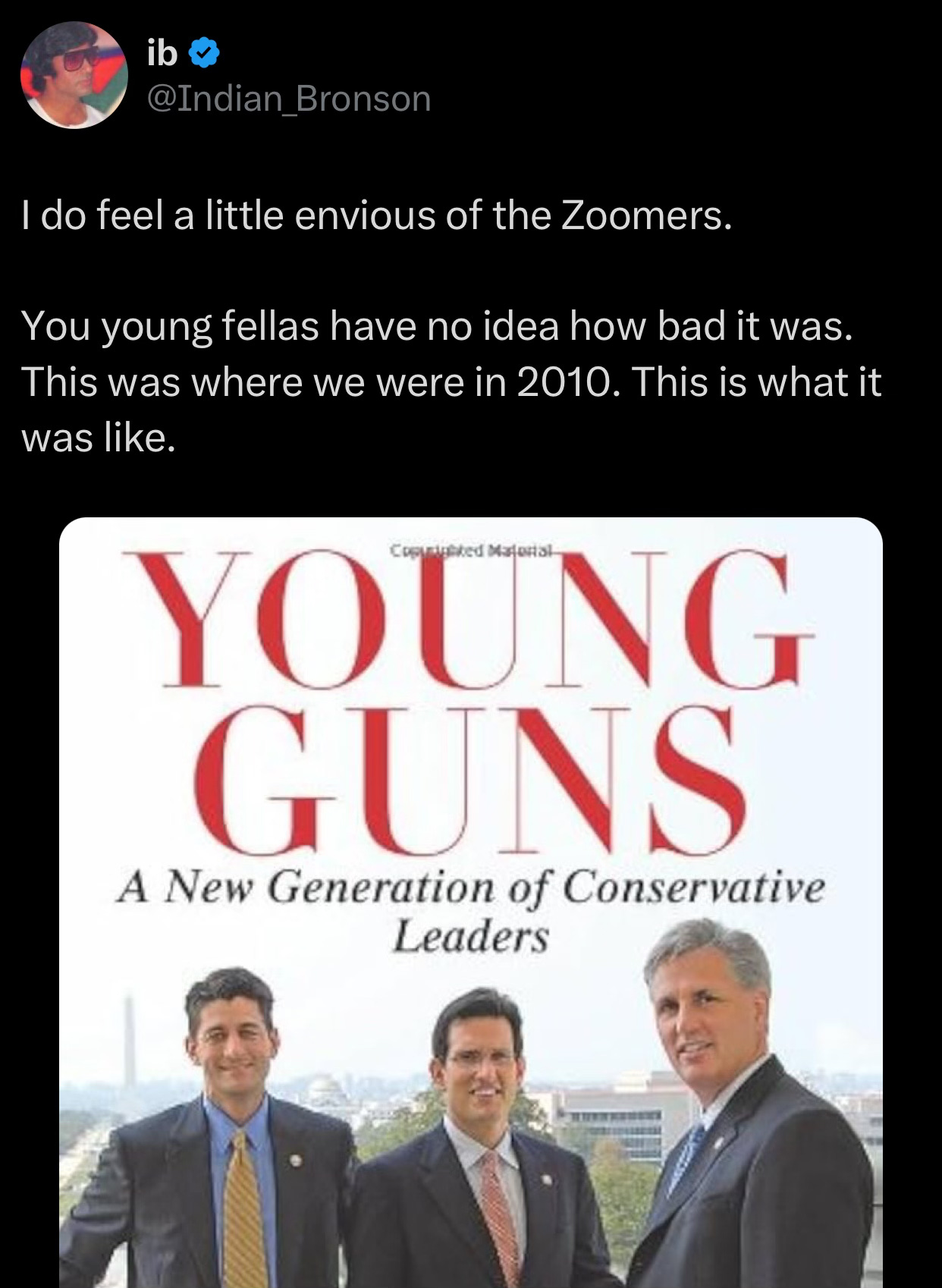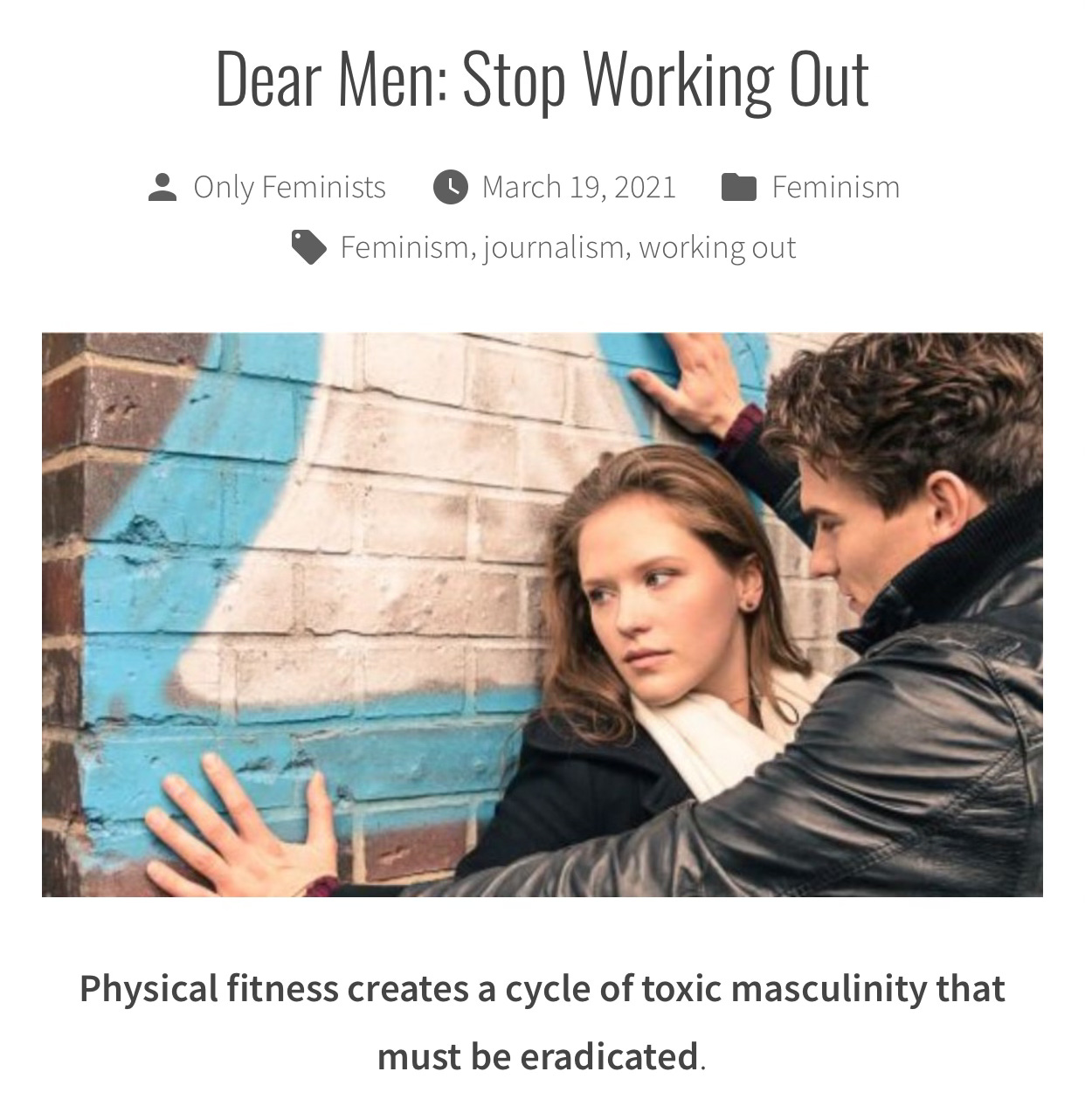In such deranged times as ours, it’s hard to blame anyone who looks back with wonderment on the simpler days of the 1980s, 1990s, and even the 2000s—when Gillette ads celebrated high-T Chads, when it was normal to see waitresses at Chili’s who looked like Sydney Sweeney, when pot was not yet legalized and hip hop was not yet the default American music. From our vantage point today, those years seem like the Golden Age of American Empire.
But the nostalgia is a trap. Underneath the dreamy surface, the Golden Age was a time of stifling pieties and mass confusion—to which no one should wish to RETVRN. As rough as things are now, a critical mass of men has been freed from the spell of the old pieties and given the possibility of clear-sightedness. We should be supremely thankful for the developments which make clarity possible. It’s dearly bought, but real—and it’s the basis for the hope that our country might have a future.
I want to take stock of what’s been gained in recent years. Here’s a list of a few significant signs of life in deranged times.
1) Opposition is no longer so effectively controlled
What made the Golden Age so dark was the cleverness with which the authorities thwarted those who weren’t impressed by the cult of endless Progress. Potential troublemakers were directed to harmless and pre-approved models of rebellion against the age—led into a special subdivision of Plato’s cave in which the shadows of Reaganism, Enlightenment individualism, diluted Christianity, and market fundamentalism were thrown against the wall. Opposition to the Regime was trained to obey the Regime’s framing: “Leftists are the real racists,” “I’m not against mass immigration, just as long as they do it legally,” “Creative destruction is cool,” and so on.
For the longest time I was perfectly unaware that outfits like National Review and the Cato Institute had been allowed their own roped-off spaces for playacting at opposition—because they tacitly agreed to pose no actual threat. If anything, their historical purpose was to monitor the Right and report anyone who refused to rebel by the rules. It was National Review’s job to banish Pat Buchanan and call him names.
Even the arch-traditionalism of Russell Kirk and Roger Scruton fits neatly into the system—offering the model of the unhappy bystander who can only shake his head and quote elegiac poetry as his way of life is destroyed. Again, no threat.
But now sensitive young men are discovering more threatening possibilities than those espoused by low-energy magazines and establishment-adjacent think tanks. This is the start of something.
2) The necessity of ordo amoris has become painfully obvious
It’s hard to overstate the importance of the heatmap meme and the clarity of thought it represents. Once upon a time, the Regimist argument for empathy met almost zero pushback. Who could oppose it? Weaponized empathy soon elevated the claims of outsiders of any sort, particularly foreigners but also criminals and deviants. If you didn’t extend maximal understanding or leniency toward them, you found yourself on the wrong side of history—and you could not consider yourself a proper Christian. Because: the Lord said to love everyone in the world as your neighbor, forgive them preemptively, and buy them stuff, or something like that.
We’ve gone far enough down that path to now see that all our rage for empathy has costs. It means neglecting our duties toward those with a real claim on us—our actual neighbors, our children. We owe Laken Riley more than we owe the Venezuelan savage who killed her.
Ordo amoris dictates that you should try to help outsiders only after you’ve done your duty to your family, your friends, your actual neighbors. This seems like the most obvious point in the world—but it wasn’t at all obvious in the heady days of the 90s and 00s. You hardly heard a word about it.
3) Sane ecology is now a possibility
During my formative years there was a no man’s land between the Greenpeacey environmentalism of the Left and the “conservative” insistence on the rights and privileges of Big Business. The greener-than-thou types had the makings of a compelling argument: we really shouldn’t trash God’s Creation. But they never framed it that way. Environmentalism, if anything, was an obnoxious challenge to the Faith, with heavy intimations that God blundered in giving human beings dominion over the natural world—and that people should save the environment by killing themselves. Their project was also so wrapped up in other disqualifying tenets of Leftism, like naive belief in the power of bureaucratic regulation. But the alternative wasn’t much better. For these “conservatives,” commerce had been sanctified and the rights of Big Business must not be infringed by filthy hippies and commies.
Recent years have brought better possibilities. With the pivot from global warming to global climate change, the old environmental movement became not just obnoxious but abstract, a mystery cult which relied on sophisticated instruments to count particles in the air and the ice. Their solutions also became increasingly baffling. They actually favored cutting down forests in order to clear space for “solar farms” and dispatching all those cows who were drinking so much water and polluting the air with their flatulence. As for all the trash now everywhere, these activists show far less concern. They're more worried about speculative developments in the air than Burger King bags on the ground and Mountain Dew bottles in the rivers.
This lunacy makes space for opponents of the Regime to stake a claim for sound living and for stewardship of God’s creation.
4) Big Business declared itself your enemy
Big Business has leaned leftward for a long time now—outsourcing American jobs, pleading for the immigration of foreign laborers who will work for lower wages, pushing for equality, worshipping fashion, slouching toward Globohomo, selling degraded product. The difference now is that executives are so blatant about it that everyone knows where they stand, which has freed non-Leftists from the obligation to offer excuses for them.
The Pandemic made it clear that the clean division between Big Government and Big Business is a fantasy. When lockdown measures were enforced, the authorities found very willing partners in the airlines, banks, and big box stores; large employers could insure compliance much better than the agencies. Meanwhile, small businesses (deemed “nonessential”) were conveniently crushed—because these are a threat. They make possible one of most unconscionable things to the Regime Mindset: independent livelihoods.
A good argument can now be made the difference that matters is not the old public-private dichotomy (government: bad; business: good). The difference is scale—Big Government and Big Business are both menacing; neither the Department of Education nor Blackrock is your friend. Mass brings with it all sorts of terrors: the HR mindset, lowest common denominator morality, bloat, cheapness, and so on. Perhaps there are some exceptions—certain operations which can do important work at scale—but the small-is-beautiful model is superior to the gigantism that accelerated during the Golden Age.
5) Big Expertise was exposed
The Science is the best example. At some point in recent decades a craze emerged. People could be seen in t-shirts saying “I F#ING LOVE SCIENCE.” An astrophysicist and “science communicator” named Neil deGrasse Tyson became a household name and Bill Nye the Science Guy was a thing again. Pretty much all claims made in the presence of educated people had to be backed up by “studies” and “data.” Truth had been reduced to that which could be measured. Science had also become anthropomorphized, capable of making declarative statements—headlines informed us that such-and-such was true “according to science.”
Then Covid—that reaper whose scythe cut down so many old ways of thinking—undid the Revenge of the Nerds fantasy. Reasonably observant people started to see that The Science had become a weapon in the hands of political and corporate interests, as Anthony Fauci claimed that attacks against him were “attacks against science” and “studies” on the vax were fudging numbers. Pretty soon those same observant people came to question other scientific dogmas, particularly about what’s “healthy.” They started to notice that what’s “healthy” so often overlaps with what’s in a megacorp’s interest.
The claims of Big Science had long been that it was incorruptible, somehow above the political and financial pressures that interfere in the affairs of non-scientific men. A guy has to appreciate the aspiration—if only it had some basis in reality. But it turns out science is not so far removed from all other human endeavors under the sun! Now we can stop pretending that it is, and we can start to build a more solid foundation for understanding the world and ourselves without the pious reverence for researchers whose studies and findings face a replication crisis.
The last few years also offer a case study in the limits of The Science or any kind of expertise to dictate policy. Even if Fauci and company had been telling the truth, their recommendations have to be weighed against other concerns—for example, the damage that their scientific policies would inflict on an entire generation of children stunted by the lockdowns. Narrow expertise can help inform decision-makers, but it cannot make decisions for their decisions for them.
6) Vitality entered the conversation
Vitality matters and is a reflection of larger concerns. If a nation grows fat and sickly and lethargic, its moral, political, philosophic, economic, and scientific suppositions have to be called into question. A chronically rotund and low-energy society does not understand human flourishing or how to create the conditions which allow it.
One now sees articles that are virtually indistinguishable from satire: directives to men (particularly white men) to stop lifting, warnings from Experts that it’s bad for you, connections drawn between fitness and fascism. It’s increasingly clear that training and not being a chump have right-leaning implications. And the attempts to re-engineer young men haven’t taken. Boys still look up to those who are physically strong and want to be strong themselves, and in the effort to develop physical strength they learn other lessons that militate against Leftism.
On some level the other side knows this. That’s why they sometimes contradict their own message and make appeals to their foot soldiers to get stronger so they can “punch Nazis.” The cluelessness tells. Case in point: the author of an infamous MEL feature about the “#Swoleleft” chose as his representative of Leftist Vitality a guy who “at his best” deadlifted 280 lbs. Not 280 kg—but 280 lbs.
(Slight qualification: Leftists can still stake a claim to certain forms of “fitness”—like yoga and jogging. The one is an exercise of eastern self-annihilation and the other a good way to lower testosterone. They can definitely have those.)
7) Gayness lost its momentum
Anyone who had the gall to oppose the gay rights movement during the Bush or Obama years was standing in the way of a freight train of cultural momentum unlike anything most of us had ever seen. There was a whiplash authority with which they overruled popular referendums, punished high-profile people who voted with the majority in favor of a heteronormative understanding of marriage, took “fag” and “homo” out of the vocabulary, and otherwise imposed their vision.
But it only took a few years for the movement to outrun its own prestige, as the rainbow flag has been made aesthetically revolting by the inclusion of brown and black and pink stripes. The bit about simply wanting to visit their partners in the hospital and otherwise wanting to share in the traditional and hetero American dream has been called into question. (See: monkeypox. See: gay men renting wombs to have baby boys delivered unto them.)
8) New Atheism became a joke
The Golden Age was a nightmare for anyone even halfway serious about the Faith. Our tradition had been on the backfoot for a few decades, first with the botched attempts to “update” the Church, then with revelations about sexual abuse among the clergy. The Da Vinci Code—which features a few hundred pages of Dr Robert Langdon’s lectures about Catholic corruption and the secret marriage between Jesus Christ and Mary Magdalen—sold 80,000,000 copies. (Between lectures, Langdon also duels a giant albino assassin with ties to Opus Dei.) The only religious energy seemed to be in the Evangelical megachurches—which were well-intentioned but fed into the cultural irony-machine and provided endless fodder for people like Jon Stewart.
These developments culminated in the heyday of New Atheism and the much vaunted “Four Horsemen.” But a lot seems to have happened since their moment in the saddle. Two of the horseman have gone to the grave. One openly longs for the “cultural Christianity” of his youth. Another seems hellbent on embarrassing himself when he goes in front of a microphone. The unofficial fifth horsewoman has become a Christian.
Meanwhile, the Church is gaining strength almost in spite of the people at the helm, and the reports of her demise seem to have been greatly exaggerated.
9) Public school history class has been dismissed
For a long time, the only history we were taught suggested a tremendous political axe-to-grind: the Holocaust, the transatlantic slave trade, Apartheid, Civil Rights, Woman’s Rights, and so on. This was basically the extent of what I remember learning in public schools (with just a bit of Ancient Egypt and the American Revolution added in). The heroes were Harriet Tubman, Anne Frank, Martin Luther King, Nelson Mandela, the suffragettes.
Thanks be to God, alternatives to the European-Man-Bad Theory of History are now flourishing. An example near and dear to my heart is the rehabilitation of the Crusades in recent years, thanks to the work of Thomas Madden, Jonathan Riley-Smith, Rodney Stark, and Raymond Ibrahim. It turns out that the Christians who sold everything and marched 2000+ miles to retake Jerusalem from the Saracens were not the villains like your high school history textbooks proclaimed, but heroes of the highest order.
It also turns out that history is a lot more wild and exciting than you had been led to believe. This revelation, like so many other items on this list, is the start of something.
Conclusion
These are a few reasons why we should never wish to retvrn to the Golden Age of American Empire, a time of delusion, and should be thankful for the advances of recent years. Reality often has a double-edge to it: our gains have been dearly bought and we still have an incredible mess before us, but at least we know where we stand (and know that the ground beneath us is firmer than it has been in a long time). Nostalgia is fun but you can’t live there.
There is no going back. Back doesn’t exist. Our opponents put a torch to it. There is only forward and something new to be built by those with the heart to overcome the difficulties in the way.









Also just look at the crime, std, and divorce rates to learn just how fun "muh 90's golden age" was. But the GDP graph was constantly going up though!
Will check out your authors on the crusades and if you have any history or other book recommendations would love to hear them.